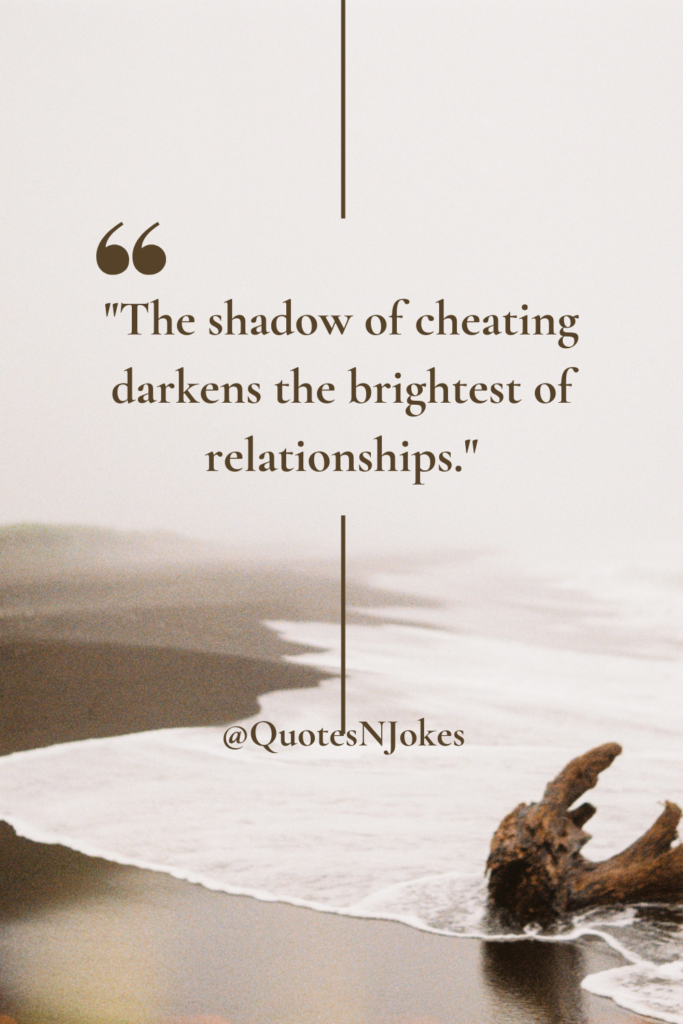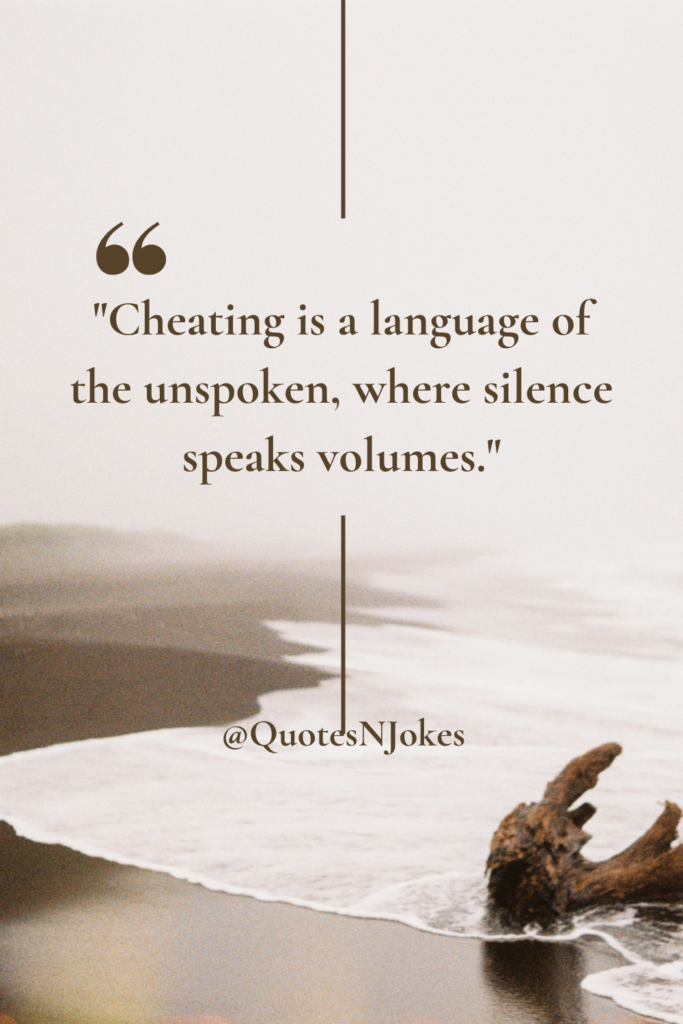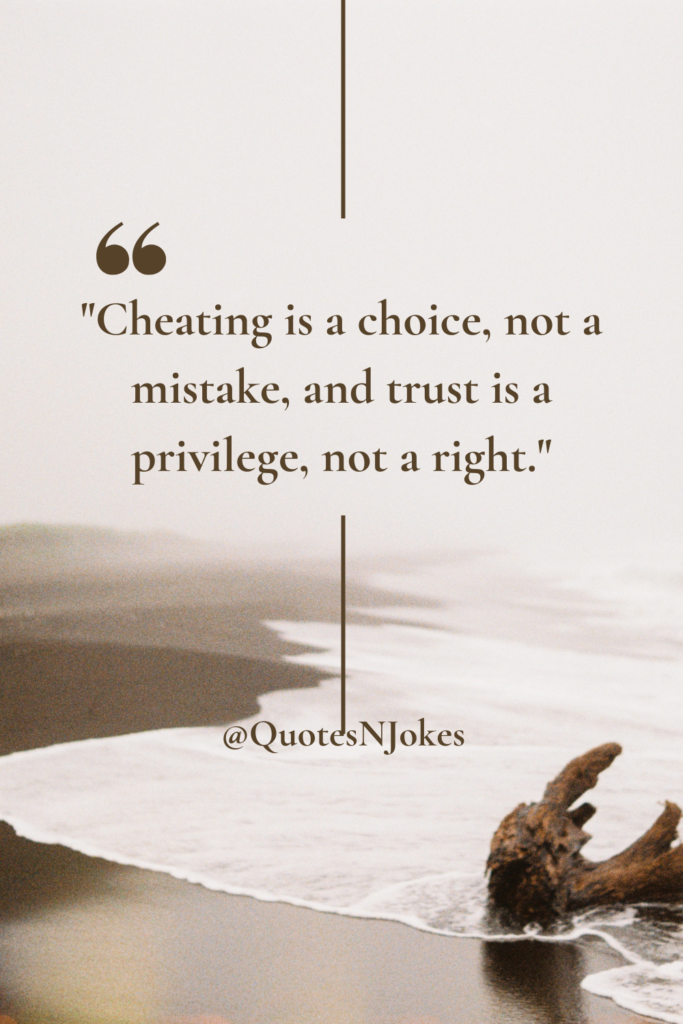In the intricate tapestry of human relationships and academic endeavors, the act of cheating is a thread that disrupts the pattern of trust and authenticity. It’s an age-old vice that has adapted to modern times, finding new expressions through technology and AI. These original quotes on cheating peel back the layers of this deceitful act, revealing its impact on the individual spirit and collective moral fabric.

Table of Contents
Cheating Quotes
1. “Cheating is the admission of defeat in the game of honesty.”

2. “A cheater’s victory is a triumph of deceit over trust.”
3. “In the economy of trust, cheating is the most costly bankruptcy.”
4. “Betrayal paints a story where loyalty was never the protagonist.”
5. “The shadow of cheating darkens the brightest of relationships.”

6. “Cheating is the illusion of success in the mirror of integrity.”
7. “Cheating is a choice, not a mistake, nor an accident.”
8. “When trust is traded for lies, the currency of loyalty becomes worthless.”
9. “Cheating is a language of the unspoken, where silence speaks volumes.”

10. “To cheat is to rob oneself of the opportunity to be genuine.”
11. “Cheating is the theft of someone’s right to the truth.”
12. “The cost of cheating is the price of one’s honor.”
13. “A heart that cheats never wins, it only deceives itself.”

14. “Cheating in a relationship is like putting poison in your own well.”
15. “To cheat is to weave a web in which one ultimately becomes ensnared.”
16. “The echo of cheating is a haunting melody of regret.”
17. “Cheating is the shortcut that leads to the dead end of respect.”

18. “A cheater’s words are like a house of cards, ready to fall at the slightest truth.”
19. “In the race of integrity, cheaters never cross the finish line.”
20. “The mask of cheating eventually wears thin, revealing the face of loss.”
21. “Cheating on a test is stealing the diploma of your own future.”

22. “Cheating is like painting over rust; it may look good momentarily, but the damage is still there.”
23. “When you cheat, you set the stage for your own tragedy.”
24. “Cheating is a choice, not a mistake, and trust is a privilege, not a right.”

25. “Cheating is the thief of joy, robbing us of both love and respect”.

Cheating, an act as old as time, continues to challenge the foundations of trust and integrity in our personal and academic lives. The quotes provided offer a reflection on the nature of cheating—its fleeting victories, its corrosive effects on relationships, and the inevitable reckoning with one’s conscience. In the end, cheating is a self-inflicted wound, a ghost that haunts the cheater with whispers of what could have been had they chosen the path of honesty. As we navigate the complexities of life, may these insights serve as reminders of the timeless value of integrity.
The Main Effect of Cheating: Understanding the Impact on Relationships
Cheating is one of the most painful experiences a person can go through in a relationship. It breaks trust, causes emotional distress, and can have long-lasting effects on both the person who has been cheated on and the one who cheated. While the effects of cheating can vary from relationship to relationship, the main and most significant consequence is the damage to trust.
The Destruction of Trust
Trust is the foundation of any healthy relationship, and cheating destroys it. Once trust is broken, it can be incredibly difficult to rebuild. The person who has been cheated on often feels betrayed, and they may question the authenticity of everything in the relationship, including past interactions and future promises.
Emotional and Psychological Impact
Cheating has significant emotional and psychological effects on both individuals involved. The person who has been cheated on often experiences feelings of hurt, anger, betrayal, and even confusion. These feelings can lead to a range of psychological issues such as anxiety, depression, and low self-esteem.
Effects on the Person Who Was Cheated On
- Feelings of Inadequacy: The cheated-on partner may feel unworthy or as though they are not good enough.
- Loss of Confidence: Trusting others in future relationships can become a challenge, and self-confidence might suffer.
- Depression and Anxiety: Constant worrying about the relationship, the betrayal, and the future can lead to feelings of sadness and anxiousness.
For the person who cheated, guilt, shame, and regret are common emotions. They may experience a sense of loss if the relationship was valuable, or they may feel conflicted about their actions if they still care for their partner.
Effects on the Person Who Cheated
Guilt and Shame: The act of cheating often leaves the cheater feeling guilty, especially if they still care about their partner.
Fear of Rejection: The cheater might fear that their partner will never forgive them, leading to feelings of isolation.
Relationship Doubts: The person who cheated may struggle with whether they are in the right relationship or if they made the wrong decision in the first place.
Breakdown of Communication
Cheating often stems from a lack of communication or unresolved issues within the relationship. Once cheating occurs, communication tends to break down even further. The person who has been cheated on may not feel comfortable talking openly about their feelings, and the cheater may avoid confrontation out of guilt.
How Communication is Affected:
- Avoidance of Difficult Conversations: Both partners may avoid discussing their feelings or the reasons behind the cheating.
- Increased Misunderstandings: The lack of open communication can lead to more confusion and misinterpretation of each other’s needs.
- Distance and Isolation: Without effective communication, partners may become emotionally distant, creating more space for resentment to grow.
Restoring communication is essential for healing, but it can be very difficult after cheating. Couples therapy or open, honest conversations can help address the core issues that led to the cheating.
Loss of Self-Worth and Emotional Health
When someone is cheated on, they often feel a deep sense of emotional injury. Their self-worth and sense of emotional health can be affected. Feelings of betrayal, rejection, and low self-esteem may lead to a person questioning their value and ability to maintain a healthy relationship in the future.
For the person who cheated, there may be internal conflict as they wrestle with guilt and regret. These feelings can cause anxiety and a diminished sense of self-worth. The emotional toll can affect their overall well-being and may lead to feelings of depression or self-hate.
The Impact on Future Relationships
The main effect of cheating often extends beyond the current relationship. When someone has been cheated on, they may struggle to trust future partners, even if the new relationship is healthy and strong. Similarly, the cheater may experience difficulty in future relationships, carrying baggage from their past mistakes.
Future Relationship Consequences:
- Difficulty Trusting Again: Both parties might have trouble trusting new people, which can make it hard to form deep connections in the future.
- Fears of Repetition: The person who cheated might fear repeating the same mistakes, while the cheated-on person might fear being hurt again.
- Long-Term Emotional Scarring: The emotional scars of cheating may last long after the relationship ends, influencing both partners’ ability to love and trust in the future.
Can a Relationship Recover After Cheating?
While cheating can have devastating effects, it doesn’t necessarily mean that the relationship is over. Some couples can recover and rebuild their relationship after cheating, though this requires effort from both partners. Here’s how couples can work through it:
- Open Communication: Both individuals need to have honest and vulnerable conversations about what happened and how they can move forward.
- Rebuilding Trust: This takes time and requires both partners to be committed to proving their trustworthiness through actions.
- Seeking Therapy: Couples counseling can help address deeper issues and provide strategies for healing.
- Forgiveness: True forgiveness is essential for moving forward. This requires emotional growth from both sides.
However, recovery isn’t guaranteed. Some relationships may not be able to bounce back from cheating, especially if trust is irreparably broken.
Conclusion
Cheating can cause deep emotional pain and lead to long-lasting consequences for both partners. The primary effect of cheating is the destruction of trust, which can be hard to rebuild. Emotional and psychological damage, breakdowns in communication, and loss of self-worth are also common outcomes.
If you’ve experienced cheating, it’s important to acknowledge the pain it causes and seek support. Whether you decide to work through it together or part ways, understanding the effects of cheating can help you make the best choice for your emotional health and future relationships.
